Famous Turkish YouTuber under fire for racist remarks, fueling far-right debate
 Turkish YouTuber Taylan Ozguc Danyildiz, aka the Testo Taylan. (Photo via HalkTV)
Turkish YouTuber Taylan Ozguc Danyildiz, aka the Testo Taylan. (Photo via HalkTV)
A prominent YouTuber known as Testo Taylan is at the center of a growing controversy after a video surfaced in which he made racially charged comments and discriminated against children based on their ethnicity.
The incident has sparked widespread outrage, highlighting the broader issue of rising far-right sentiments and racism – particularly in Western countries.
Details of the incident
The YouTuber, reportedly named Taylan Ozguç Danyildiz, has amassed nearly 750,000 subscribers. In the controversial video, he visited Tostcu Yakup, a popular TikTok personality known for his sandwiches.
Before distributing food to children playing outside the shop, Taylan asked them, “Are you Syrian?” After receiving a negative response, he handed them a sandwich, which had previously fallen to the ground. He then asked another child, “Are you Turkish?” before giving her a sandwich upon confirming her nationality.
Context of far-right ideologies
This incident occurs amid increasing global concerns about the influence of far-right ideologies, as documented in recent reports.
These movements are characterized by their focus on nationalism, racism and xenophobia, often targeting Muslims and migrants.
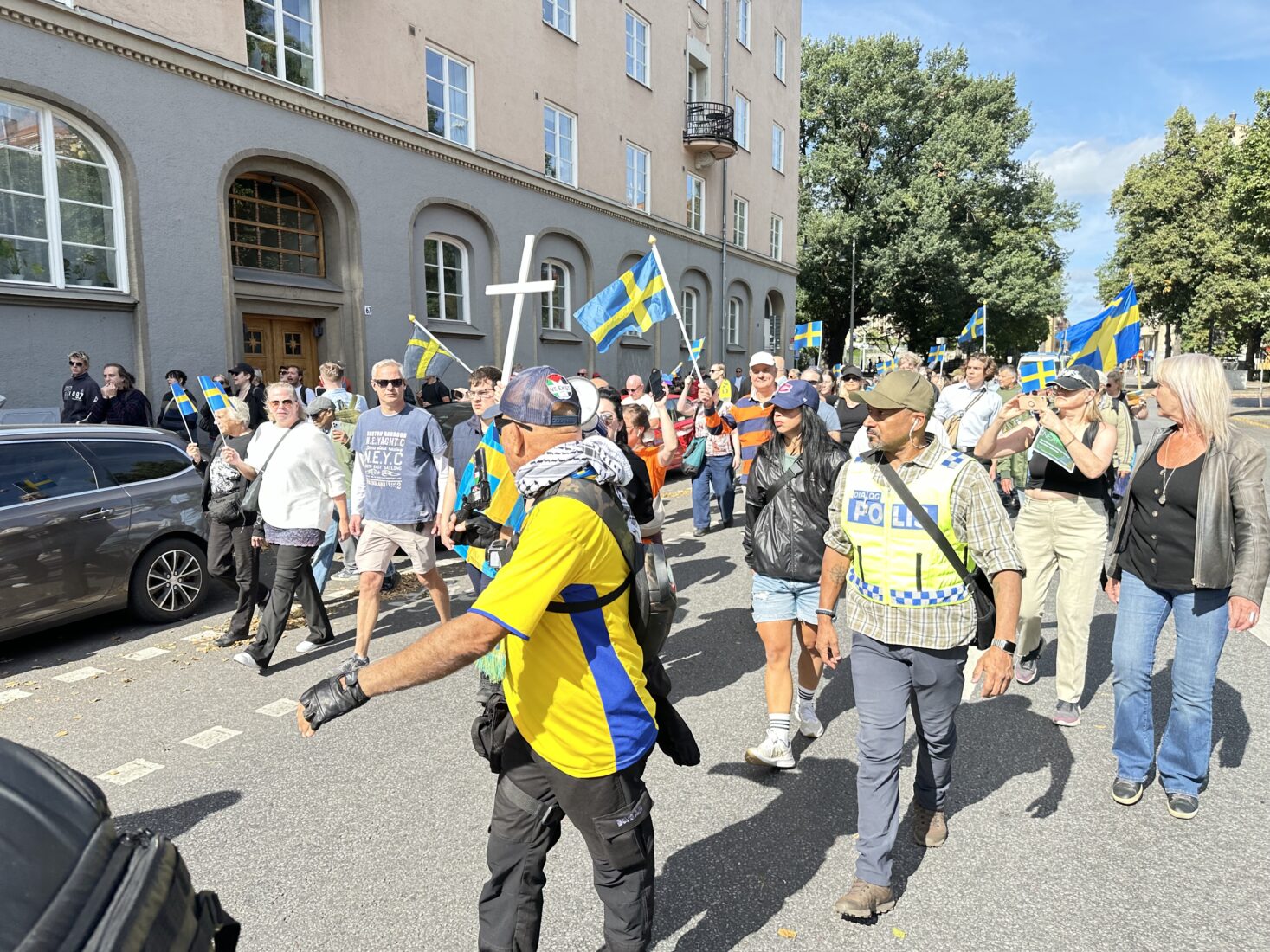
Connection of fitness clubs, far-right
Far-right groups have been known to use various platforms, including sports and fitness clubs, to propagate their ideologies, especially targeting youth aged 13-18. As Testo Taylan also produces content in fitness, this proves the document that is written by the Turkish National Intelligence Academy (NIA).
The far right is increasingly recruiting via online fitness groups, whose popularity soared during the pandemic, prompting fears that new members are being radicalized to commit acts of violence.
The rise of these movements is linked to the exploitation of societal fears and the spread of propaganda through sophisticated and often covert networks, including online platforms like Telegram.
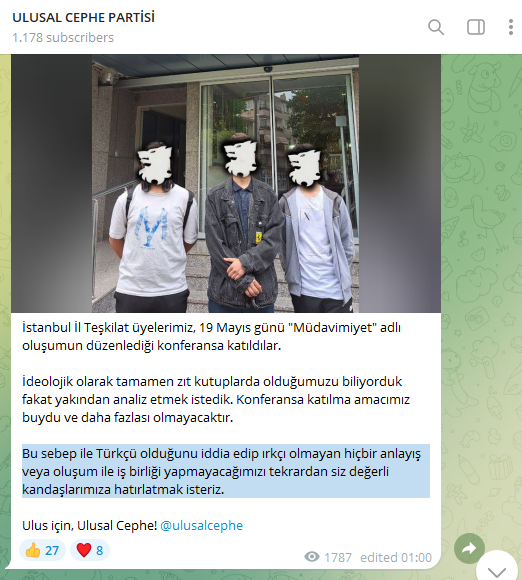
Public outcry
Taylan’s actions have been met with severe backlash on social media, where many have accused him of reinforcing harmful stereotypes and engaging in blatant racism.
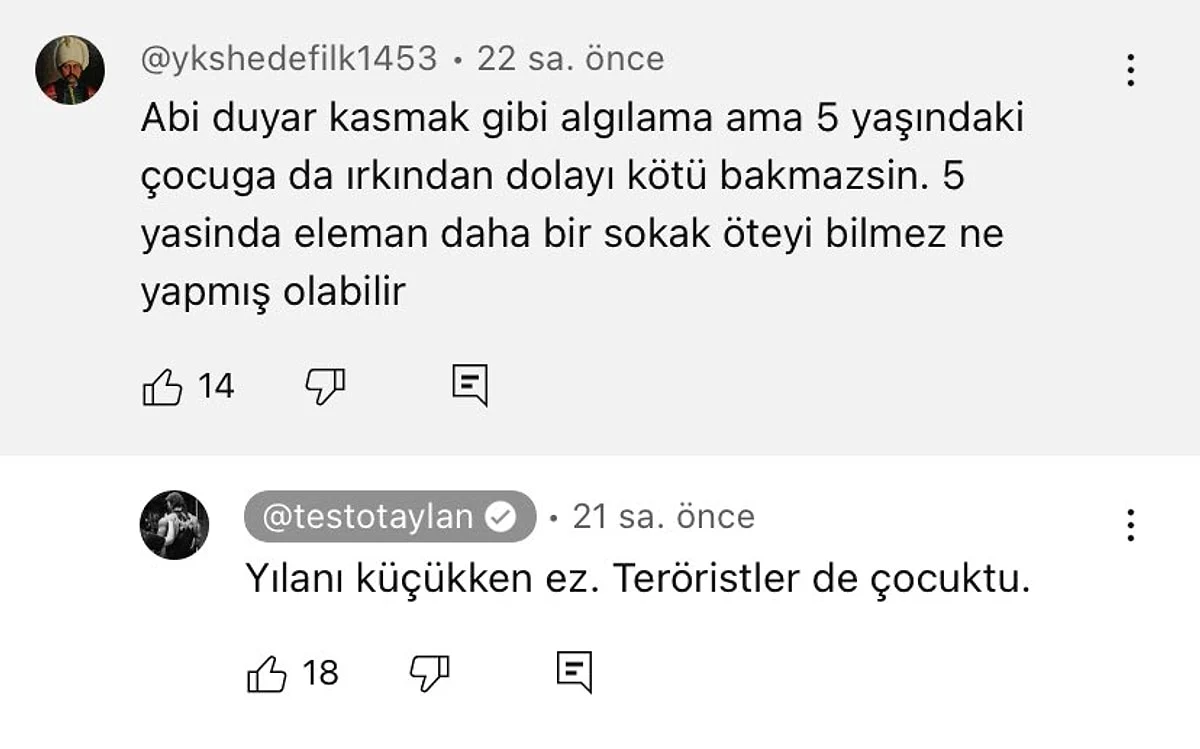
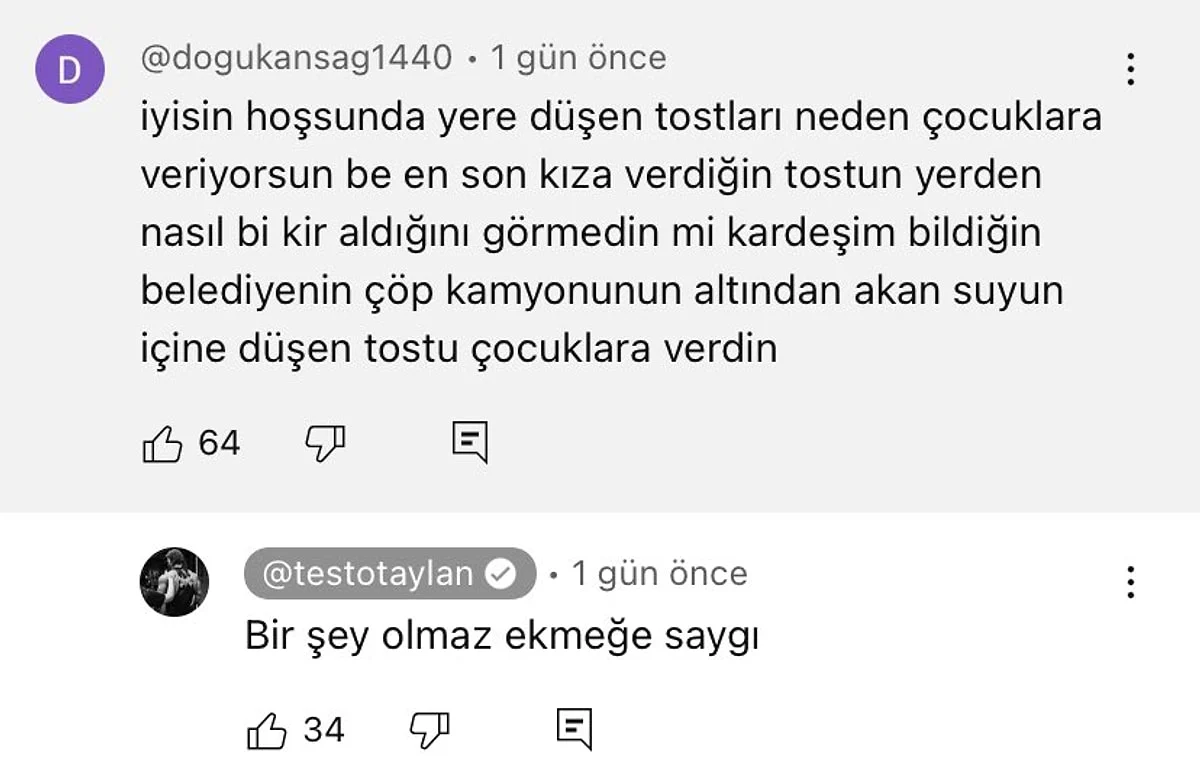
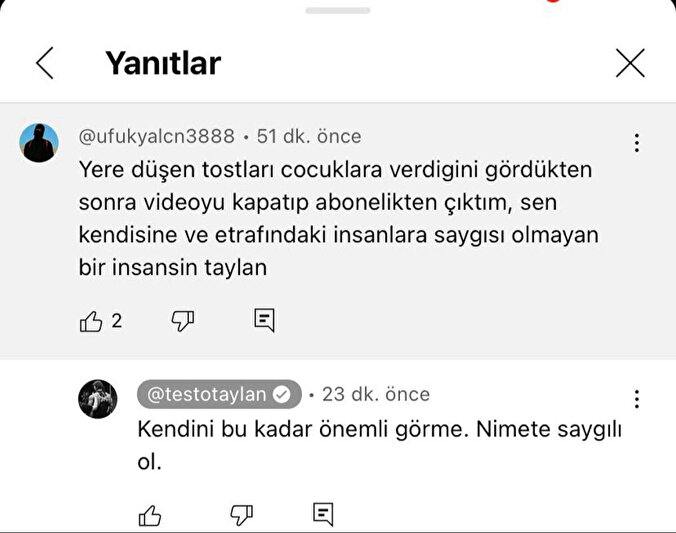
Translation of these comments from:
- “Brother, don’t take it as being insensitive, but you don’t look at a 5-year-old child badly because of his race. A 5-year-old doesn’t know a block away, what could he have done?” -Taylan’s reply: “Smash the snake when it’s small. The terrorists were children too.”
- “You’re all well and good, but why do you give the children the toast that falls on the ground? Didn’t you see how the last toast you gave to the girl picked up dirt from the ground, brother, you gave the children the toast that fell into the water flowing under the garbage truck of the municipality.” – Taylan’s reply: “It’s okay, respect for bread”
- “I unsubscribed from the video after I saw him giving the toasts to the children, you are a person who has no respect for himself and the surrounding people, Taylan.” – Taylan’s reply: “Don’t think you are so important, respect the blessing”
Other comments:
- “Feeding the toast that fell into the garbage water to poor children, the sneakiness underneath your mocking smile did not suit you.”
- “There may be hundreds of nations, languages, religions and sects in the world, but there are only two kinds of people: those with a conscience and those without a conscience.”
- “If you go to a rich neighborhood just because they look bad, will you be able to do the same thing to the children there?”
- “What are you thinking, Taylan? What kind of mentality is it to ask a young child, ‘Are you Kurdish?’ What kind of mentality is this? I’ve never seen such a disgraceful thing.”
The incident resonates with the alarming trend of increasing intolerance and the mainstreaming of far-right ideologies, which pose significant threats to social cohesion and minority rights.
Critics have also pointed out the failure of security and intelligence agencies to adequately address and mitigate these growing threats, particularly in Europe, where racially motivated attacks often go under-reported or are downplayed.
According to the Turkish National Intelligence Academy’s report, key characteristics and methods far-right groups are like this:
- Decentralized but unified by common enemies: While far-right groups may differ in their specific ideologies, they often converge around common enemies and develop similar strategies to confront them. This has led to an increase in transnational activities and collaborations among these groups.
- Online dominance: The majority of these activities are organized online, with physical participation in events or actions remaining limited. The internet provides a safe space for these groups to recruit, plan and spread their propaganda without the immediate threat of law enforcement intervention.
- Targeting youth: A key focus for far-right groups is the recruitment and radicalization of young people, particularly those aged 13-18. They achieve this through various channels, including online gaming platforms, social media applications, and health/fitness clubs. These environments are used to subtly introduce and reinforce far-right ideologies among impressionable youths.
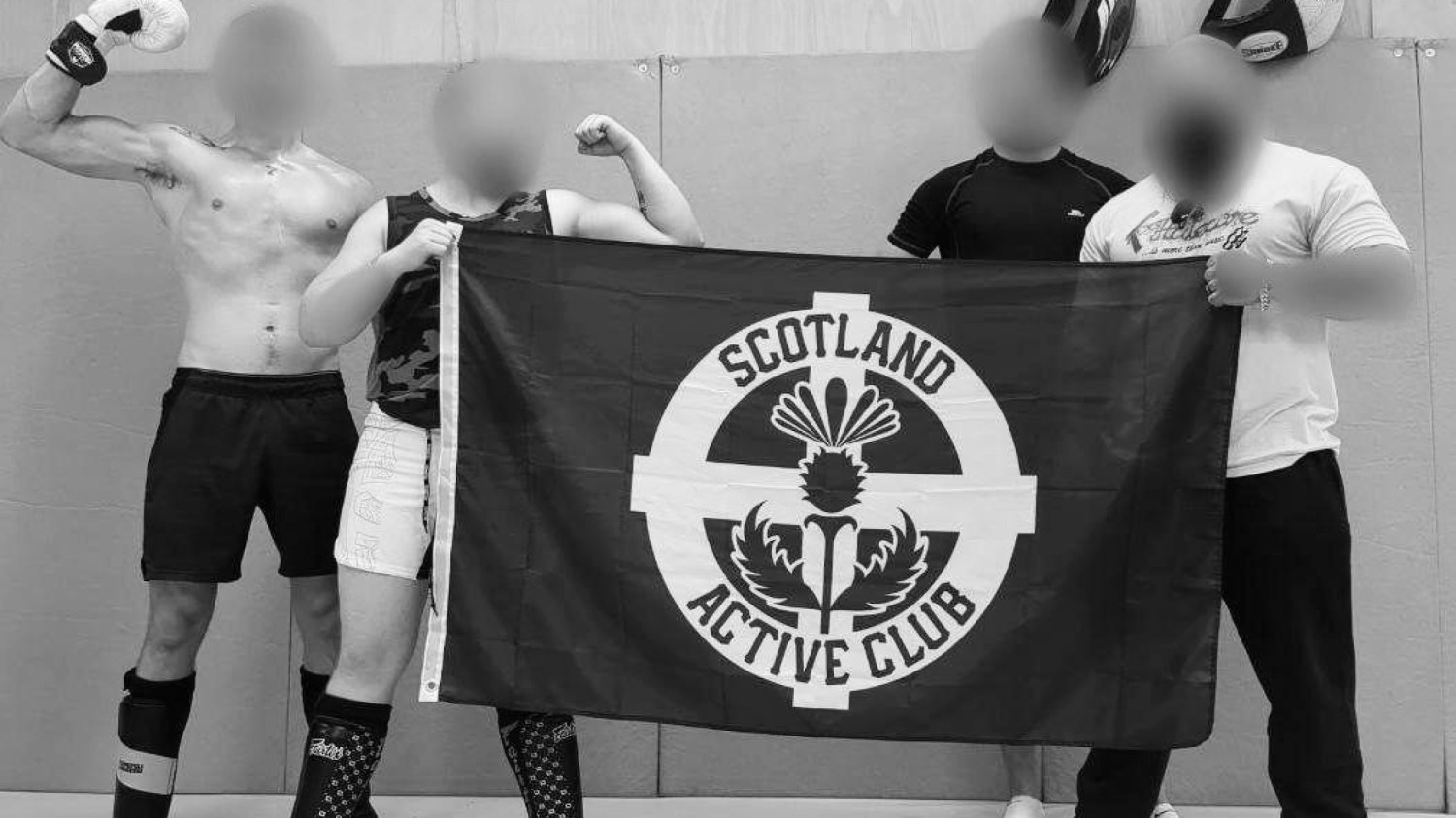
- “Lone Actor” Attacks: One of the most effective and concerning tactics used by these groups is the promotion of “lone actor” attacks. These are often individual acts of violence that are inspired by the group’s ideology but carried out independently by the attacker. These attacks are encouraged and justified through the dissemination of manifestos that detail the motivations and goals behind the actions.
- Glorification of violence: These groups often glorify individuals who carry out such attacks, labeling them as “martyrs” or “saints,” which serves to inspire and recruit others, especially younger individuals, into their ranks.
- Advancements in weaponry: The use of technology, such as 3D printing to create weapons, has also become a significant tool for far-right groups. This technology allows them to produce firearms and other weapons with minimal costs and reduced risk of detection by authorities.
- Funding and support: While lone actors typically finance their attacks, the groups themselves often obtain funding through legal means. However, there has been an increase in using alternative financial systems, including online platforms, to support their activities.
- Combat experience: Some members of these groups seek out combat experience and access to explosives/weapons by participating in conflict zones. This experience is then brought back to their home countries, where it can be used to further their cause.
Türkiye’s first lone-wolf attack, the Eskişehir attack
An 18-year-old assailant carried out a brutal attack that left five injured in Eskisehir. This marked the first incident of its kind in the country. Despite being ranked the 10th safest city globally by Numbeo, Eskisehir became the scene of the first hatred-motivated mass knife attack in Türkiye.
Before the attack, the assailant published a 16-page manifesto titled “The Mass Cleaner Handbook”. The cover of this document featured the Nazi SS symbol, a clear indication of the extremist ideology that fueled his actions. In the manifesto, he makes a declaration: “Don’t believe the lies of the filthy Jewish media. This is a lone wolf attack.”
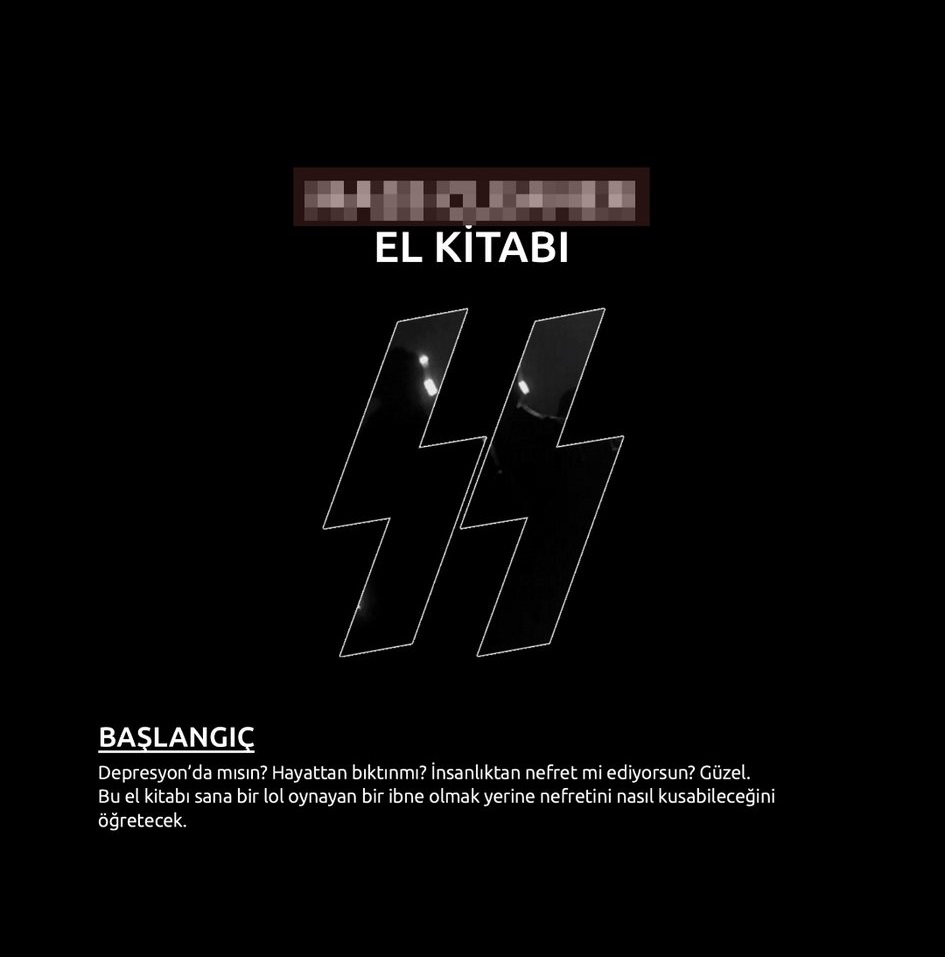
The attack in Eskisehir is not an isolated incident but part of a larger, disturbing trend.
The 18-year-old was influenced by far-right groups in the U.S. and Europe. These groups have become increasingly adept at using the internet to target and manipulate young people, particularly in countries like Türkiye, where there are significant immigrant populations.
This attack has exposed a new threat in Türkiye – the rise of lone-wolf extremism influenced by global far-right ideologies.



